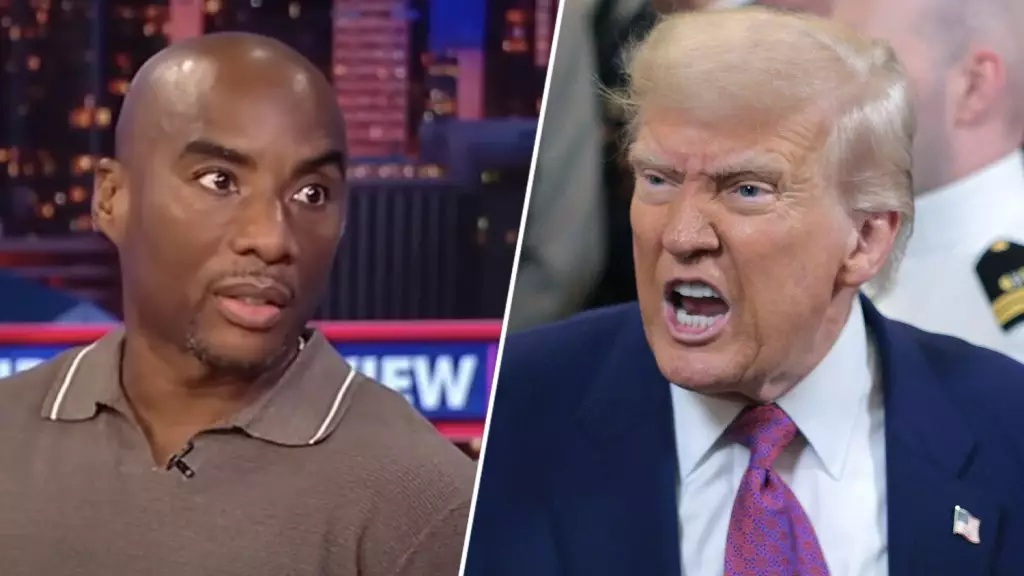The recent exchange surrounding Lara Trump’s interview with Charlamagne Tha God uncovers more than just rivalry; it exposes the deep fissures within the Republican Party and its loyalist base. While Lara, a prominent figure in Trump’s camp, attempts to craft a conservative narrative on her Fox News platform, Charlamagne’s candid criticisms and revelations threaten to ignite an internal upheaval. The incident signifies that the once cohesive MAGA movement is now visibly splintered, with cracks widening along ideological lines and personal loyalties.
Trump’s furious response—calling Charlamagne a “low IQ individual,” a “racist sleazebag,” and firing off a barrage of personal attacks—resembles desperation rather than strength. It demonstrates a leader increasingly on edge, vulnerable to criticism that cuts too close to the bone. His reaction underscores how fragile his grip on power has become, as the thunderous echo chamber of social media amplifies dissent and exposes conflicts that threaten his influence.
Furthermore, the personal nature of Trump’s attack reveals much about the psyche of a man cornered. Instead of engaging substantively with criticisms or discussing policy, he resorts to name-calling and deflection. This behavior hints at an erosion of confidence and a reliance on public bravado to stave off vulnerability. His disparagement of Charlamagne, whose sharp political insights challenge the narrative Trump desperately clings to, signifies a broader crisis of credibility within his inner circle.
The Epstein Saga: A Ticking Time Bomb for Trump and His Allies
Amid these internal conflicts, the Jeffrey Epstein scandal remains a malign shadow over Trump’s presidency and post-presidential reputation. Despite hints from credible outlets like the Wall Street Journal about potential links and associations, mainstream Fox News has downplayed or outright avoided discussion of Epstein’s extensive network.
This strategic silence may reflect an implicit acknowledgment of how damaging the scandal could be, especially as evidence suggests Trump and Epstein had mutual acquaintances and possibly more direct ties than publicly admitted. The ongoing controversy risks fueling accusations of hypocrisy and undermining the core narratives that Trump’s base cherishes—tough on crime, patriotic, and moral guardians of “family values.” When a significant faction of the GOP begins to question the legitimacy of the claims or the silence surrounding Epstein, it could ignite a civil war within the party itself.
Charlamagne’s pointed commentary on the matter, viewed as “taking a different viewpoint,” echoes growing frustration among conservatives and traditionalists who perceive the Republican Party as having drifted from its original principles. His prediction about “a political coup” signals an awakening among disillusioned voters and politicians, potentially paving the way for a realignment that marginalizes Trump’s influence and power. Such talks reflect an undercurrent of discontent that could fundamentally reshape the party’s future trajectory.
The Future of Conservatism: From Trump to New Leadership
The ideological divide is visibly manifesting in the contest for the soul of conservatism. Charlamagne’s suggestion that Jon Stewart might run for president in 2028 serves as an insult to Trump’s authority but highlights a desire among some voters for a new kind of leadership—one less fueled by populist rage and more committed to rational governance.
His endorsement of Kamala Harris for re-election also underscores the shifting allegiances across the political spectrum. The once-reliable Republican voter base is increasingly open to alternative voices, driven by recent scandals and internal strife. The notion that traditional conservatives can indeed “take their party back” indicates a substantial movement toward restructuring the political landscape, away from the bluster and chaos that has become emblematic of Trumpism.
In the end, the tumult within the Republican Party and the broader Trump orbit reveals a leadership in crisis. Whether it’s his personal outbursts or the unresolved scandals hanging over his name, it’s clear that the foundation of Trump’s political empire is trembling. The future, it seems, hinges less on his ability to rally the base and more on whether the party itself can evolve beyond the spectacle of personal feuds and divisive loyalties.
